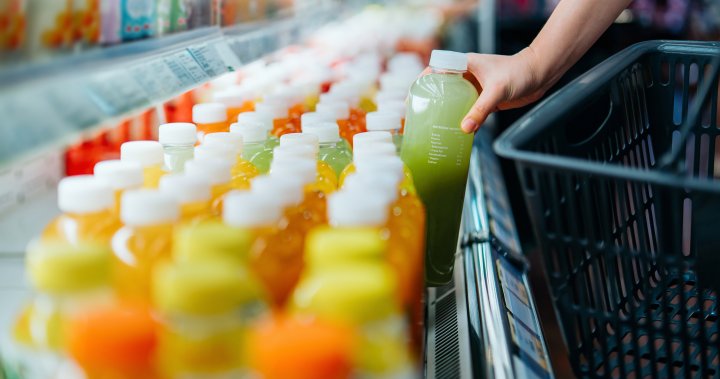Drinking a daily glass of 100 per cent fruit juice – a staple drink for many kids – is linked to weight gain in both children and adults, a new study suggests.
The peer-reviewed research published in the JAMA Pediatrics journal Tuesday found that each additional serving of eight ounces of fruit juice with no added sugar per day was associated with a 0.03 increase in BMI, or body mass index, among kids.
Children younger than 11 years old showed a greater BMI gain than older children, the study said.
Researchers at the University of Toronto and Harvard Medical School looked at 42 different studies – 17 involving children and 25 with adults.
Overall, they didn’t find a strong link between weight gain and fruit juice consumption for adults due to differences in how calories were measured. But some studies that did not account for the intake of calories showed a weight gain of 0.21 kilograms in adults.
“Hundred per cent fruit juices is, of course, a healthier alternative to a fruit drink or a sugar-sweetened beverage, like a soda, but the issue with these 100 per cent fruit juices is they contain little or no fibre compared to your whole fruit form,” said Michelle Nguyen, lead study author and a PhD candidate in the department of nutritional sciences at the University of Toronto.

Overconsumption is the main concern here, said Nguyen. For instance, a typical glass of orange juice will contain about three oranges and two glasses would contain six oranges – something one would be less likely to eat in one sitting.
Get the latest Health IQ news.
Sent to your email, every week.
“These beverages can very well be easily over-consumed, leading to both an excess of calories as well as an excess of sugar,” Nguyen said in an interview with Global Wednesday.
Liquid calories, which have been shown to lead to a higher weight gain compared with solid calories, as in whole fruit, could likely be factor here, Nguyen said.
“Compared with whole fruit, 100 per cent fruit juice contains less dietary fibre, leading to the rapid absorption of fructose in the liver,” the study noted.
The American Academy of Pediatrics recommends limiting fruit juice intake to four ounces per day for toddlers aged one to three years, four to six ounces daily for children aged four to six years and less than eight ounces for children aged seven to 18 years. The AAP does not recommend juice for babies under 12 months of age, unless clinically indicated.
Health Canada and the World Health Organization recommend adults and children limit consuming free sugars, including those found in 100 per cent fruit juices, to less than 10 per cent of total energy intake. Free sugars are defined by the WHO as any added sugar to food and drinks as well as naturally occurring sugar in honey, syrups, fruit juices and fruit juice concentrates.

When consumed in low or moderate amounts, 100 per cent fruit juices also have health benefits. They contain antioxidants, polyphenols, vitamins and minerals that are found in a whole fruit, Nguyen said.
The study didn’t find any significant differences in the types of fruit juices when it comes to weight gain.
However, Nguyen said “superfood”-type juices, such as pomegranate, blueberry, goji, currant and tart cherry, were associated with “greater benefits” compared with apple, citrus, and grape juices, which tended to result in weight gain.
Even though the increase in BMI found in the JAMA study was small, this can add up over a child’s life, the authors said.
They recommend delaying the introduction of 100 per cent fruit juice in young children, moderating serving sizes, and favouring whole fruit instead.
Starting in 2026, Canada will require that companies add nutrition warnings to the front of pre-packaged food with high levels of saturated fat, sugar or sodium.
“Ultimately, we hope these findings will support public health guidance to limit the consumption of fruit juice, especially among younger children, and to consume whole fruit rather than fruit juices,” Nguyen said.
Water should be the beverage of choice, she added. Low fat milk or soy milk are also good alternatives, as well as unsweetened coffee and tea for adults.
— with a file from The Canadian Press.
© 2024 Global News, a division of Corus Entertainment Inc.




